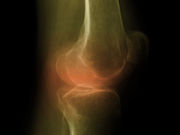Most frequently cited barriers were in domains of patient and health care professional
FRIDAY, Nov. 18, 2016 (HealthDay News) — In current knee osteoarthritis care, both personal factors and factors related to health care professionals play a role in treatment nonadherence, according to a study published online Nov. 14 in the Journal of Evaluation in Clinical Practice.
David Spitaels, M.D., from the Catholic University Leuven in Belgium, and colleagues interviewed 11 patients with knee osteoarthritis using a semi-structured script based on quality indicators. Direct content analysis was performed to describe barriers and facilitators in six domains: guideline, health care professional, patient, social environment, organization, and financial context.
The researchers identified 38 barriers in all six domains. The most commonly cited barriers were in the patient and health care professional domains and included patients’ disagreement with guideline recommendations, negative experience with drugs, patients’ limited understanding of the disease process, and poor communication by health care professionals. Barriers of “insistence on medical imaging,” “fear that physical therapy aggravates pain,” and “perception that knee osteoarthritis is not a priority health issue” further explained the patients’ disagreement with recommendations. Twenty facilitators were also reported, all of which were listed as opposing barriers and included good communication/relationship with health care professional, positive experience with physical therapy, and strong social support.
“Patients indicate that both personal factors and factors related to health care professionals play an important role in nonadherence,” the authors write. “Future guideline implementation strategies should take the identified barriers and facilitators into account.”
Full Text (subscription or payment may be required)
Copyright © 2016 HealthDay. All rights reserved.








